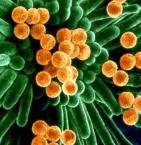Allergy - a branch of medicine that studies the actual allergy and allergic diseases, the causes and mechanisms of their origin, methods of prevention, diagnosis and treatment. The relevance of this science is increasing every day due to the increase in the number of people who suffer from allergies. The main task in the tactics of treatment of allergy - is to identify and reduce the allergen, but rather eliminate its impact on the patient's body.
Allergic diseases that occur more often - is:
allergic rhinitis,
atopic dermatitis,
bronchial asthma,
seasonal hay fever,
drug allergy,
food allergy,
allergic conjunctivitis,
angioedema,
urticaria,
various dermatoses,
ENT diseases with acute and chronic form.
Very often children suffer from allergies. It manifests itself in the form of their food allergies, skin, home - and it is completely different ways. Often there is cutaneous dermatitis atopic, seborrheic, knotted, herpetiformis. His untreated leads to a transition in the severe stage of the disease - eczema.
From Allergic rhinitis also suffer a lot of people, but it is not a congenital disease. Its causes - is inhaled allergens of a different nature: vegetable, household, fungi, animals. It is manifested nasal of impassability, sneezing and itching.
Dangerous as food allergies, because it can cause a severe allergic reaction of immediate type - swelling Kvinke, which requires resuscitation.
Diagnosis and treatment of allergies
Diagnostic examination must be conducted, only it will help to properly assess the disease.
First is detecting an allergen, and then is taking steps to eliminate it by means of local and general medicines. The most commonly used method of treating an individual specific desensitization. This method allows develop for a body of matter, who are coping with the allergen.
What is immunology?
Immunology studies the structure and patterns of the normal functioning of the immune system, as well as its pathology and methods of immunotherapy and correction. The task of the immune system - is to protect the body against genetically foreign antigen in the form of bacteria, viruses, protozoa, as well as their own cells that have changed as a result of mutations.
With age, the immune system with its control function, as well as the timely destruction of foreign agents, ceases to cope. As a result, are accumulated a changes in the body which lead to aging and the formation of a chronic disease.
About The problems with immune says the availability of diseases for which there is impairment adequate immune response. These include viral infections in chronic form, which do not lend themselves to conventional therapy: cytomegalovirus, herpes, chlamydia, human papilloma virus, Epstein-Barr virus, mycoplasmosis; frequent and prolonged respiratory diseases; hydradenitis and abrasions with relapses.
Diagnosis and treatment of immune system diseases
Diagnosis begins with the collection of patient complaints. About low immunity says symptoms such as:
- Fast fatigability and constant fatigue.
- Migraine or frequent headaches.
- Insomnia, or vice versa - drowsiness.
- Body aches in joints and muscles.
- Catarrhal diseaseswith duration more than a fortnight with frequent repetitions.
- Suppurative tonsillitis, stomatitis, rhinitis, laryngitis, laryngitis, gingivitis, with relapses.
- Availability of subfebrile body temperature within 37-38S long time.
- Chronic acute herpes.
- Problems with the gastrointestinal tract.
For diagnostic use the immunogram, ELI-tests, for treatment - immune a corrective therapy.
hide
 Allergology and immunology - sections of medical science who study the human immune system diseases, as well as deals with issues of its structure and functioning.
Allergology and immunology - sections of medical science who study the human immune system diseases, as well as deals with issues of its structure and functioning. 






